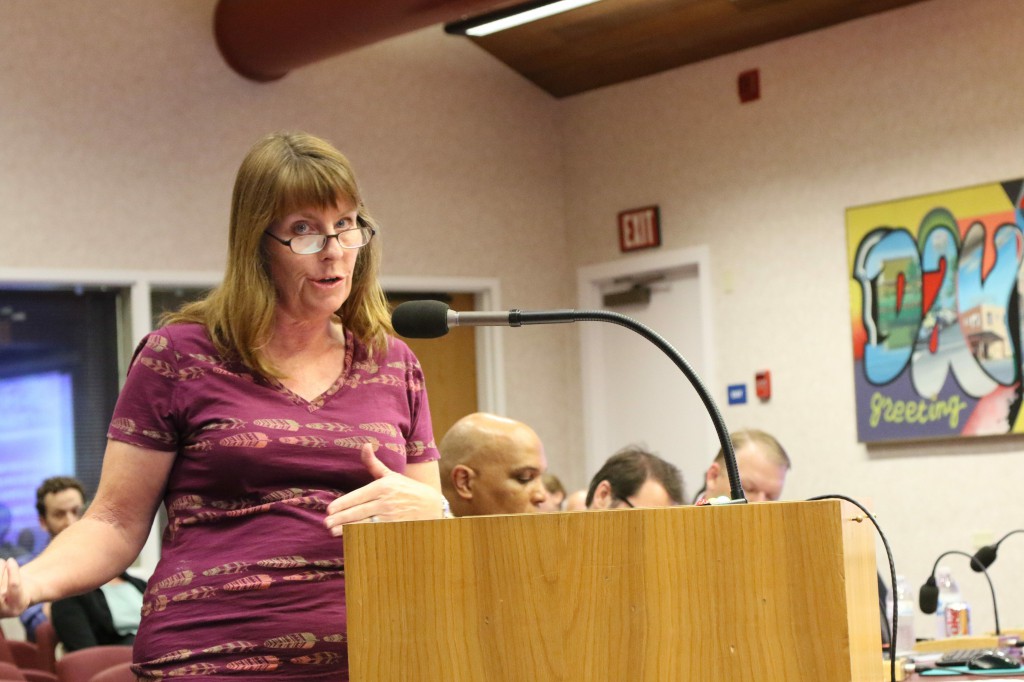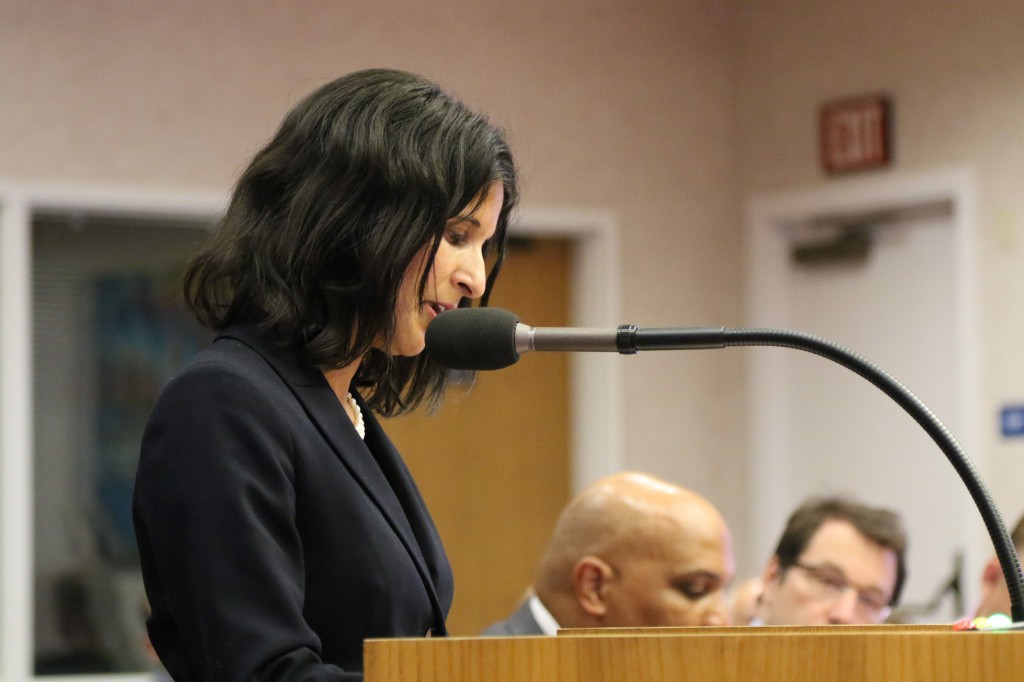

Part Two – 45 Public Comments
The public came out and expressed thanks and criticism to the board, sometimes in the same comment. There were concerns expressed about the program – on one side, about the treatment of kids who were not in the program, criticisms of segregation and bullying and the strengths of differentiated education. On the other side were concerns about process, the laying off of Deanne Quinn and the needs of gifted but under-achieving children.
Forty-five people in all spoke – many passionately and many making strong and eloquent points on both sides of what might be described as the divide. There was a slight advantage in the audience and among the speakers – to the pro-AIM side of the issue – but it was slight.
By our count, 24 of the 45 speakers were in favor of AIM/GATE. Almost the entire left side of the chamber seemed filled with GATE supporters while 75 to 80 percent of the right side (which was maybe at 60 percent capacity) was pro-change.
Barbara Branch from the California Center for the Gifted said that “It is often misunderstood that the current budget that districts receive no longer include GATE funds. That’s not really true, while categorical funds have been taken away… and the Governor wanted to move towards the (LCFF), whatever funds the district received in the 2008… that’s the funding they still receive.”
Gifted children, she said, “learn differently. They are not just high achieving children.” She said, “They learn differently. They think differently and they often have social and emotional needs that are different.” She added, “Those sets of challenges cannot always be met in the regular classroom.”
Luisa Guenther has spent ten years teaching self-contained GATE in DJUSD. She said, “It is concerning and demoralizing that conclusions and decisions are being made without the teachers in the program being contacted. She said there are a number of teachers currently teaching in the district and more who are retired but still live in the community. “None of the researchers contacted us.”
The board, she said has not reached out to them and the board has not asked them to help. She stated, “To me it would appear that our expertise is not appreciated.”
Corey Parker, a parent, said, “I believe that education for the gifted works.” He said we need a gifted program at Davis, but thinks it can be improved. He said he would support reform if “it eliminated the lottery. I don’t see any educational benefit to the students of that system.”
He wants the program more rigorous and said if the district is going to eliminate private testing, you make the public testing closer to the private testing. He said private testing “is more accurate and it eliminates the distractions the students experience.”
Finally, he said, “You base the reforms and evaluations on the whole child testing social and academic needs finding out with whom and where they would thrive the most.” He said, although there is criticism about the program because it is not equal, “I do not believe that it compromises equality.”
Wendy Amundsen thanked the board, “not for any particular outcome, just for the process you’re doing.”

Elaine Talley thanked the board for the decisions, noting “these decisions have not been made quickly and they were not made without input from the community or notice to the public. The debate over the GATE program has occurred over many years, moving at a “glacial pace.”
She later added, “We don’t need to segregate our children, those children do not need to be segregated to be successful. All students deserve to be treated equally in our district and all students can benefit from the best practices of the district.” She added, “Our teachers are quite capable and up to the task of teaching all our children in inclusive settings.”
Gale Tyros thanked the board for “returning the focus to the public education of every child. To the closing of the achievement gap rather than allocating the district overhead and resources to a program that really has evolved into an exclusive private education.”
She said that an appropriate identification level is about 5 percent in our district, “30 percent is just way too much.” She closed by thanking “a lot of people supporting these very small moves towards social justice.”
Craig Lundgren also supported what he called “progressive changes.” He said that the program has “been artificially inflated for political reasons so it can be large with a large constituency so that it can be untouchable.”
He criticized the TONI (Test of Nonverbal Intelligence) test where kids who did not achieve high levels before suddenly were scoring in the 98th percentile. “I think if you gave the TONI test across the board to all of the students in the district, you would likely get 50 percent of the kids qualifying for GATE education.” He said what that means is “there’s no need to segregate these kids.”
He said he is an attorney and there was no violation of the Brown Act. “There is a specific exception for exactly what the board did. The Board actions were well-known, people knew that there was going to be a vote on whether the contracts were approved or not approved.” He added, “I cannot see a Brown Act violation.”
Karen Hamilton thanked the board but noted that “there are many in the community that are feeling very fearful and concerned that their children’s needs are not going to be met.” She said that the district has not prioritized encouraging teachers to “really differentiate in the regular programs.”
She said all of the research suggests “that is best practices.” She said Davis is an outlier and most districts have gotten rid of self-contained GATE in favor of differentiated instruction.
Susan Thomas told the board that they moved here when their child was in the middle of the fourth grade and missed the opportunity to test their child during the district’s cycle. “My concern is for people who do move to Davis, who are coming into the middle of their child’s education, how will those children be identified and have their needs met (if private testing is banned).”

Shama Mesiwala explained that she wrote the school board expressing her “strong dissatisfaction with the Board’s vote not to renew Ms. Deanne Quinn’s contract.” She told them, “I have lived in Davis for 20 years, have been a Davis homeowner for 13 years and am the parent of a young child who has not yet entered the Davis public school system. One of the guiding factors in deciding to make Davis my family’s home was the quality of our public schools.”
In response she received a letter to a trustee that she provided to the Vanguard and read from during public comment. The Board member wrote, “If you don’t have a child in the public school system, I'[m] assuming you do not know Ms. Quinn and have no experience with our current school system and AIM program. Given this, I am not sure how you can comment accurately on the position of someone you do not know and a school system that you have not joined yet. How can you assess if our school system is deteriorating when you have not yet experienced it? I don’t mean to be rude, but I am really unsure of how you can make these statements with no personal experience of our schools.”
She responded to the email stating, “I do indeed personally know Ms. Quinn. She welcomes conversations about education with parents, including myself, who care about the quality of schools in Davis and who have made long term investments in remaining in this community. She is the person to whom parents like myself turn when we have questions about best practices in education.”
She explained that education “is the fabric of our community,” and “this board represents education in our community.” She said she has “entrusted” the board “with soliciting input from our community about the decisions that affect our children, and then appropriately analyzing that input, among other data, and informing our community.”
She added, “In performing these functions, this board must inspire trust and confidence. When the board makes decisions about the AIM program – a program that is 2000 students strong, a program that has a long waiting list, and a program that is not broken – late at night, without notice to the public, and when Deanne Quinn is let go without any explanation after 23 years of exemplary service, that trust and confidence is called into question. To me, it means our education system has deteriorated.”

UC Davis Professor and former candidate for school board Bob Poppenga referenced the June 4 meeting and stated, “I believe that these questions should be addressed in a public forum so we can all hear the responses.” First, “Why the rush? Take a step back and ensure a fair and open process is being followed.”
He asked what this means. “The focus of assessment will be to identify students whose needs cannot be met in classrooms which fully implement best practices of differentiated instruction.” He continued, “How are you going to ensure best practices of differentiated instruction?”
Mr. Poppenga asked, with the dismissal of Deanne Quinn, which administrators will evaluate and implement this motion. “Will experts outside the district be consulted and if so, who? Why has the AIM subcommittee totally been sidelined?”
He noted the statement, “All students currently enrolled in a self-contained AIM classroom, including the AIM-identified, incoming 4th graders will NOT be affected by the June 4 Board decision.” He called it “simplistic.”
This was only the first portion of public comment and the Vanguard will publish more of these accounts in future articles.
—David M. Greenwald reporting

It really isn’t true that DJUSD is “over-identifying” for GATE/AIM.
Here are some GATE-identification figures by district for other school districts with UC campuses:
Irvine: “As a district, our GATE-identification criteria is one of the most stringent in the state, and yet we annually identify approximately 25 percent of our students as gifted.”
Goleta : 30%, much higher than nearby districts.
The two elementary schools closest to UC San Diego.
La Jolla Elementary School: 51.1% gifted-identified, 12.8% in seminar.
Curie School (University City): 54.1% gifted-identified, 5.9% in seminar.
So, no, Davis schools are not unique in having a high percentage of gifted-identified students. It seems that having a university near your schools significantly increases the number and percentage of students who test as gifted-identified.
Gifted children, she said, “learn differently. They are not just high achieving children.” She said, “They learn differently. They think differently and they often have social and emotional needs that are different.” She added, “Those sets of challenges cannot always be met in the regular classroom.”
What about going back to IQ tests to identify these children and stop the over/miss identification of “gifted” kids so that the District can provide services to those who need it?
there are some legal issues there too. but part of the problem i still have here is my concern when they talk about the over-identification of gate students, by paring it down, they’ll be making the program more white. the interesting thing to me was watching the comments – the anti-gate people were all white, the pro-gate were black, hispanic, asian, white, etc.
Here we go!
I’m not aware of any legal issues.
DP-Are you suggesting that white children have a higher IQ than those of color? Or are you saying that if you raise the threshold and use the current methods that do not identify gifted children the program will become more white?
Looking at various other districts, and at the minutes of the Davis AIM committee, you’ll find several tests and combinations of tests that are used. Each has strengths and weaknesses. Some lead to greater diversity in the numbers GATE-identified. Others don’t. If you just use the IQ test, and raise the threshold to reduce the numbers identified, it will apparently reduce diversity.
There was a legal issue (I don’t think it was an actual lawsuit, though) somewhere that led to changes in the test combinations, if I recall. I’d have to search for that. Using the TONI gets a more diverse GATE student population; if that’s your goal, adding TONI to the test mix is one way to achieve it.
I would be interested to see what other districts do to identify their gifted children at a 3-5% rate. Do you have any good places for me to start?
The important distinction that I believe is being missed in this discussion, is between those kids who by the result of nature need this program, and those kids who’s parents want them in the program because of what is often a mis-perception that the program is designed for high achieving intelligent kids.
“Gifted children, she said, “learn differently. They are not just high achieving children.” She said, “They learn differently. They think differently and they often have social and emotional needs that are different.” She added, “Those sets of challenges cannot always be met in the regular classroom.”
I believe most, if not all, of the kids who truly need the program, are readily identified by their classroom teachers early in their school experience by virtue of their behavior. The problem is not what standardized test we should be using to identify these kids, but the fact that we are using standardized tests to define what is actually a genetically derived behavioral issue. If the focus of our efforts was on identifying and providing services to those few children who truly need this special education program, instead of looking to appease those parents who’s egos demand that their child be identified as special, we would not be having this argument.
Amazing: The Board member wrote, “If you don’t have a child in the public school system, I’[m] assuming you do not know Ms. Quinn and have no experience with our current school system and AIM program. Given this, I am not sure how you can comment accurately on the position of someone you do not know and a school system that you have not joined yet. How can you assess if our school system is deteriorating when you have not yet experienced it? I don’t mean to be rude, but I am really unsure of how you can make these statements with no personal experience of our schools.”
I can’t believe that a board member told someone in the community that she had no right to comment on the school system when she didn’t have a child in the schools. It reminds me of Lovenburg–who told Davis to move on and not think about the Nancy Peterson-coach issue any more. https://davisvanguard.org/2014/03/analysis-lovenburg-allen-tell-community-to-move-on/
Why wasn’t the board member identified? That board member doesn’t think that the letter writer has enough personal experience to make such comments but is more than willing to take her money in the form of school parcel taxes. She’s paying for it so she has the right to sound off.
I was not provided with the name
Maybe you can find out because that’s an attitude from one of the board members that I’ll bet the rest of the community would want to know who it’s coming from.
i don’t know for sure but my guess is it’s lovenburg, that’s her attitude. i don’t see archer or adams being so unnecessarily snarky.
I met Deanne Quinn once at a PTA meeting where she was doing some sort of presentation. She seemed nice and friendly. However, will all that my child went through while in the GATE program, she never had any direct contact with me or my child. I don’t know if she was involved at all. She never appeared for IEP meetings. She had no interaction with me when I was left to solve my son’s difficulties on my own, leading me to pull my son completely out of school in May of his 5th grade year, after two years of exclusion and abuse, and place him back in his neighborhood school for 6th grade. She never contacted us to ensure that he was doing well. This was when the GATE program was much smaller with only tracks at two schools – Valley Oak and Willet. When he again faltered in 10th grade, she was not part of any discussion about his options. I made the decision alone to place him in independent study, against the recommendation of Pamela Mari to place him at King High, which would have excluded him from music and drama activities at DHS.
So I am ambivalent about Deanne’s contract renewal. She was not a factor in my son’s education, even though he fell under her area of supervision. But, to hear how wonderful she is and how valuable parents find her just increases my bitterness regarding the Davis school system. For some reason, my son was not worthy of her attention. It would have been nice to have had an advocate somewhere along the line.
i think you bring up important points – first, every kid has different needs and different experiences. what works for one, doesn’t work for everyone. second, that every situation is different and that a person helpful to one kid, might not be for another.
Scheney–Thanks for sharing your story.
Unfortunately, this is the unintended consequence of setting up an AP tracking program in elementary school under the GATE banner that does not properly identify the gifted children in the District.
AP tracking program?!?! I think you need to justify your use of that (loaded) term. Non-AIM students participate freely in AP classes, and many AIM students do not.
Thank you for sharing your experience. Do you know if Ms. Quinn was invited to be part of the process? Apparently it is a district rule that she would not be allowed to attend an IEP meeting without a specific invitation from the family involved or school district (teacher or principal). When I found that out it seemed odd, but it does make sense that she doesn’t get to just show up at anyone’s IEP uninvited. It does make me wonder how many helpful resources families may be missing out on because they are not aware that specific invitations are required.
I hope your son is doing well. Once identified and placed, your son’s first advocate, after you, would have been his GATE teacher, but you could have approached Deanne directly at any time. Once your son was out of the program, he would not have been under Deanne’s supervision at all, especially if she didn’t know why you pulled him out. But even the parents who don’t choose GATE/AIM for their kids have access to her support, suggestions and information. Please don’t feel that your son was not worthy of her attention. She’d be mortified to know she missed one who needed her.
Gifted kids can be abusive and exclusionary, just like non-GATE kids can. Usually they come with extra empathy for their age, but not always. Still when kids are in a tough spot, sometimes the only thing that helps is to move them to another class, even another school, and let them start again. I don’t know if that’s possible in GATE or ever was.
This “both sides” crap really disturbs me. I have no truck with those who say everything is ‘well and good’ and must not be ‘touched’ or ‘modified/reformed’ in any way, nor do I align with those (if any) who want to end the program(s).
Fundamentally, I believe all children have gifts and talents, and the parents and the district have to do what we can to encourage and develop those. I believe the current program needs to be reformed, or re-formed. The status quo is not, in my opinion, what we want/need.
I was in a “G&T” program over 45 years ago…. there were Blacks, Asians, Whites (not any measurable Latinos in the school district then), roughly in proportion to the School District population. Our selection was based on the old IQ tests. It started in 4th grade, ended in 8th. Magnet schools. I wasn’t ‘identified’ until 6th grade. A teacher convinced my parents to have me tested/identified. I thought,”oh, I’m really smart,so I don’t have to put in effort”… el wrongo. Yet, my two years in the program ‘turned me around’. Succeeded in HS, college, and career. The two years were what I needed to be exposed to peers who were the ‘nerds’/’outcasts’ and realize I was “normal” in a different way.
“Special Ed” for the ‘gifted’ is just as important (no more, no less) than for students who are autistic, “retarded”, “normal/average”, blind, etc.
This bifurcation that David and others seem to feast on, “you either love the program, or you’re out to destroy it”, are in my opinion, neither gifted nor talented. Perhaps they need a special program to learn how to get “real”.
Mark West – those are good thoughts/comments. My guess is that if the District would require and IEP and called the Gate/AIM program “special education”, the number of parents trying to have their child enrolled would diminish significantly.
Adam Smith, you threaten AIM with tiny toothpicks and pea gravel. Hate to tell you but your idea isn’t new. You don’t even win the throw-away prize of the day. GATE once was housed together with special education in government funding. People wanted their kids in it. Then it was called Mentally Gifted Minors (ditto) and then Special Abilities (ditto) before becoming GATE (ditto) and now AIM. What’s in a nAIM to parents with gifted children?
My kid was in both, and they were equally important.
Absolutely. And there are so many of whom that’s true. But they don’t all have to have that level of problem to get lost in a classroom with students who don’t get them, teachers who think they’re fine, and years of work they’ve already put behind them.